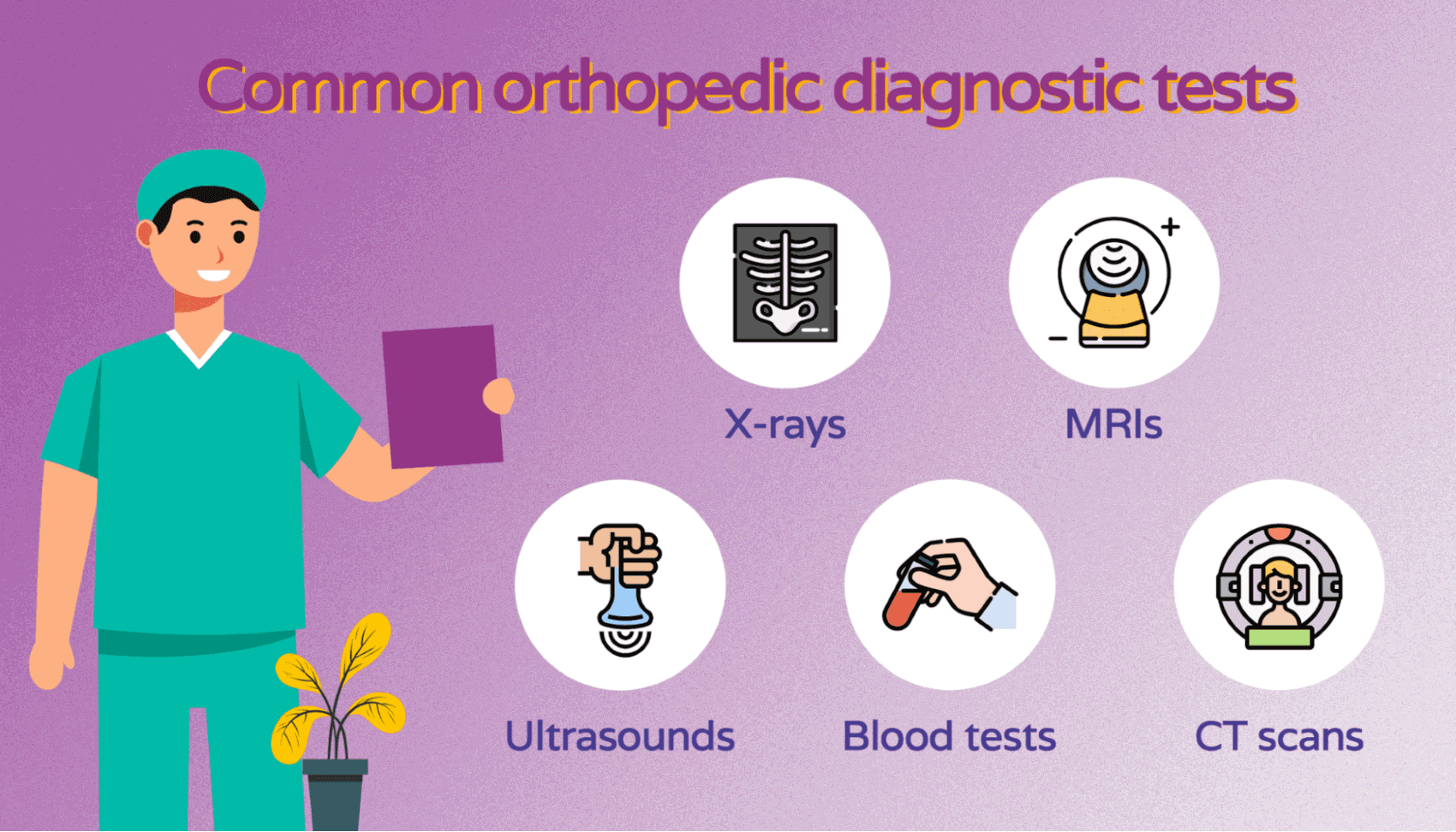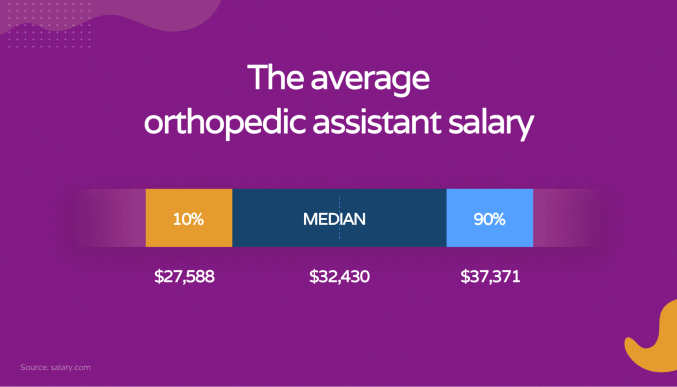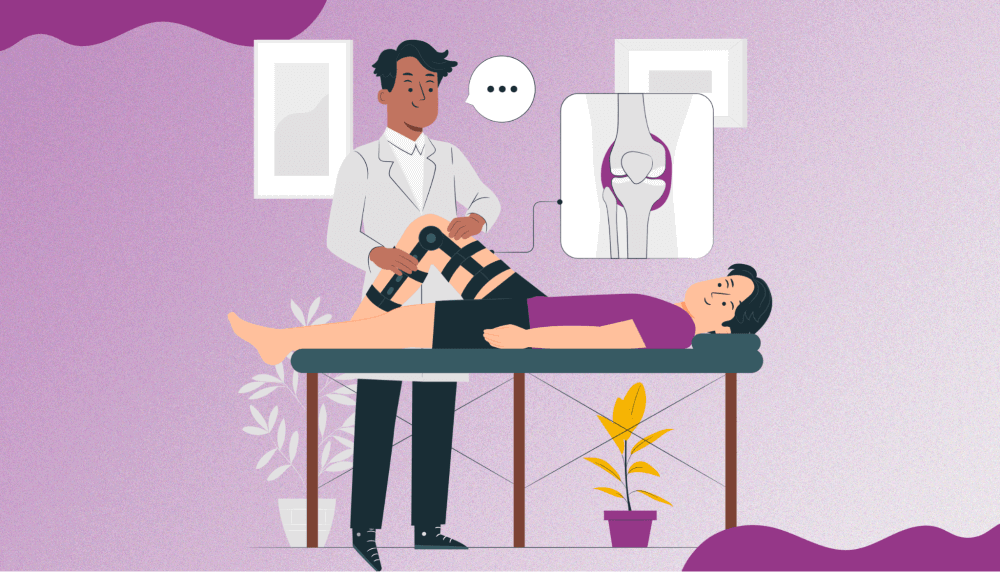Orthopedic assistants help treat conditions of the musculoskeletal system.
Back pain, osteoarthritis, bone fractures, and tendinitis are just a few examples of these conditions.
Globally, there are around 1.71 billion people with musculoskeletal concerns. These types of conditions are a leading cause of disability.
If you're looking for support, an orthopedic assistant could be a great addition to your team. They work closely with orthopedic teams, including surgeons and physicians.
To help you decide, we've put together the following article. We'll tell you what an orthopedic assistant does and how your clinical practice may benefit.
Plus, we'll explain why a Healthcare Virtual Assistant (HVA) could be a suitable alternative.
What is an orthopedic assistant?
Orthopedic assistants support doctors and surgeons while they treat patients with musculoskeletal conditions.
Orthopedic conditions can be due to injury or disease. The list includes damage to muscles, bones, nerves, tendons, and ligaments.
They work in a range of settings, including hospitals and orthopedic practices.
Orthopedic assistants fit appliances, educate patients, and help during procedures. They have good medical knowledge and perform diagnostic tests like x-rays.
The role of the orthopedic assistant can be diverse. There can be a significant amount of paperwork, including updating patient records and preparing referrals.
You can reduce their administrative workload by utilizing a virtual healthcare scribe from Hello Rache. With our solutions, your healthcare team can have more time for your patients and a better work-life balance.
Learn more about how an HVA can improve your clinical service.
What do you need to be an orthopedic assistant?
If you're interested in hiring an orthopedic assistant, there are a few things you should look out for.
To start, your orthopedic assistant should have a high school diploma or equivalent.
Most people who get hired for an entry-level role have completed a specialized training course with a certification.
Your orthopedic assistant will need medical knowledge. They should understand complex medical terminology and have basic life support training.
They'll be dealing with your patients and other health care professionals. Excellent verbal and written communication skills are essential.
Attention to detail is also important. From providing the correct treatment to compiling reports, these team members need to work with accuracy.
Orthopedic assistants need strong computer skills. Confidence using technology will help them type documents, update files, and use healthcare programs with efficiency.
Remember, an HVA can fill any gaps and take care of your repetitive administrative tasks. They work from home and come at a fraction of the cost of a full-time employee.

What does an orthopedic assistant do?
Is an orthopedic assistant right for your medical clinic? If you're unsure, we have a rundown of what these team members do.
Let's take a look at a day in the life of an orthopedic assistant.
1. Fitting appliances
When patients have surgery and other treatments, they may require supportive devices.
Appliances may be prepared pre-surgery to support patient recovery. For example, some patients may need to wear braces or splints after their operation.
Plus, crutches and front walkers can be used by patients with a range of musculoskeletal injuries.
Orthopedic assistants ensure these appliances fit. They should be comfortable for patients and be the right size for their height and weight.
Orthopedic assistants know that ill-fitting appliances can cause further issues, such as skin irritation and pressure sores. This can have an impact on the patient's recovery, so they take the time to get it right.
2. Preparing casts
Some patients have fractures that require casts. They’re usually made of plaster or fiberglass and support the bones while they heal.
Orthopedic assistants can be responsible for fracture care. They help orthopedic physicians and other specialists prepare and apply casts.
There are a few steps they need to follow, from placing a stockinette on the patient's injury to covering it with the casting material. They make sure the cast has been set and that it's the right fit for the patient.
Once the bones have healed, the orthopedic assistant may remove the cast. They use a range of tools, including cast saws and scissors.
3. Educating patients
Patient education is part of the orthopedic assistant's role. If someone has been given an appliance such as crutches or a walking frame, they'll need to know how to use it safely.
These team members use their excellent communication skills to give patients demonstrations. They answer any questions and make sure they overcome any language barriers.

If a patient has a cast, the orthopedic assistant explains how to take care of it.
For example, patients should keep their casts clean and look out for skin irritation. They should avoid putting pressure on a cast that hasn't fully set and try not to get it wet.
They shouldn't put objects under the cast and shouldn't try to remove casts themselves.
If patients have any questions, they can call the orthopedic assistant for advice.
4. Assisting during procedures
Orthopedic assistants support orthopedic surgeons during procedures. The type of help they give depends on the healthcare facility.
These assistants can be present during orthopedic surgery and pride themselves on providing exceptional patient care.
They make sure tools and instruments are sterilized and pass them on to the surgeon. They’re fully supervised and will gain new skills over time.
Orthopedic assistants can get the operating room ready for the surgical team. They refill stock before and after procedures.
Sometimes, these healthcare workers confirm surgery dates with patients and check in with the rest of the team to make sure they're available.
5. Maintaining the workspace
Orthopedic assistants need to be highly organized. Whether they're working in a private clinic with patient consultations or in a busy hospital environment, they should be clean and tidy.
A good first impression is important to give patients confidence in your service. This is why orthopedic assistants make sure the workspace is maintained.
They may be responsible for general tidying, such as putting away magazines, wiping down surfaces, and removing any garbage from the waiting room.
If they have a desk, the orthopedic assistant will make sure it's clear from clutter. Any coffee cups will be washed and put away.
It's about keeping the workspace hygienic and well-presented.
6. Performing tests
When patients have musculoskeletal conditions, an investigation may be required. Diagnostic tests are often used to assess patients.
Tests can help doctors decide what types of treatments to give their patients.
Orthopedic assistants perform or help with a range of diagnostic exams. For example, there may be MRIs, ultrasounds, or CT scans.

They can also take digital x-rays. X-rays can show fractures and help surgeons decide whether to operate or put a cast on the injury.
In some circumstances, patients will need to be referred to another healthcare facility for their tests. The orthopedic assistant may follow up on their results and share them with the orthopedic team.
7. Ordering supplies
In an orthopedic healthcare setting, different supplies are needed. There could be bandages, splints, slings, and materials for casts.
Plus, there will be general medical supplies, such as towels, gloves, and surgical masks.
Orthopedic assistants keep track of inventory. They may even use a data entry program to record what's in stock. When any essential items start to run low, they'll be able to order more.
If it's a small practice, the orthopedic assistant may also keep track of general administrative supplies. For example, the office could be running low on printer ink, paper, or coffee.
8. Consulting other healthcare professionals
The field of orthopedics can involve a multi-disciplinary team.
There is a range of medical care providers who help take care of patients, including nurses, orthopedic surgeons, physical therapists, and primary care physicians.
This healthcare community has to work together to treat the patient before, during, and after medical interventions.
The orthopedic assistant may need to consult with some of these healthcare professionals. For example, they may prepare referrals for a surgeon or send x-rays to a physical therapist.
If you have a Healthcare Virtual Assistant, your orthopedic assistant may discuss different projects.
The orthopedic assistant will use their excellent communication skills to collaborate with the healthcare team.
How much does an orthopedic assistant make?
In the United States, the annual salary range for an orthopedic assistant is $27,588 to $37,371.
The average salary falls in between at $32,430 per year. The salary can vary depending on a range of factors, including education and years spent at the company.

For example, the average salary for someone with no work experience is $31,484 a year. A person with five years of experience makes an average of $32,165.
Your location can also have an impact. Orthopedic assistants in California make an average of $36,224 per year. In Illinois, the average is $33,305; in Arizona, it’s $32,062.
Looking to hire an orthopedic assistant in New York? The average salary is $34,797 per year.
Read more in our full orthopedic assistant salary guide.
If you need administrative help, there’s a cost-effective alternative. The HVAs at Hello Rache come at a fraction of the cost at just $9.50 an hour. There are no contacts, and you can cancel at any time.
How can virtual assistants support the orthopedic team?
If your orthopedic team needs support, a healthcare virtual assistant could help fill the gaps.
Our experienced HVAs have medical knowledge and HIPAA specialized training and certification. They work remotely, so you won’t have to find extra office space. Plus, you can use them as little or as often as you like.
HVAs can reduce your workload and take care of administrative duties. When you say goodbye to repetitive tasks, you can spend more time with your orthopedic patients.
Data entry is one area our team can help you with. For example, HVAs can update patient files and databases. If you need assistance with bookkeeping, including invoicing, reconciliation, and reports, our team can do this too.

They can answer phones, schedule appointments, take cancellations, and remind patients of upcoming surgeries.
Another popular service is transcription. Our virtual assistants can take recordings and turn them into written documents. They work with accuracy and will flag any errors.
They treat all patient details with confidentiality and follow HIPAA guidelines.
When you choose Hello Rache, you’ll get access to support that’s efficient and cost-effective. It’s a flat rate, so you won’t have to worry about overtime or benefits.
Talk to us to learn more about how we can help your orthopedic team.
The role of the orthopedic assistant
Orthopedic assistants support the orthopedic team. They work in a range of settings, including private practices and hospitals.
Orthopedic assistants have a long list of duties. For example, they fit appliances and prepare casts. They’re responsible for educating patients about their injuries and explaining how to care for casts.
Orthopedic assistants assist during procedures and perform tests such as x-rays. They maintain the workspace and order supplies when they run low.
They need excellent communication skills to collaborate with other healthcare professionals.
Remember, an HVA can play a valuable role in any healthcare environment. Repetitive administrative tasks can overwhelm your workers, and an HVA can reduce their workload.
With our help, your orthopedic team can focus on patient care.
Now is the time to improve your business processes. Contact us today for more information.




